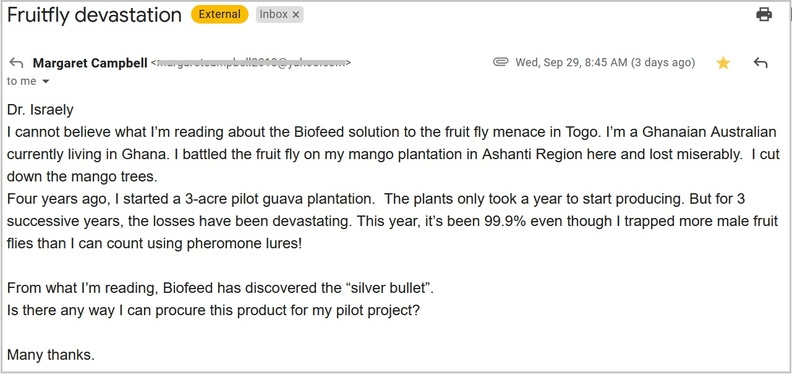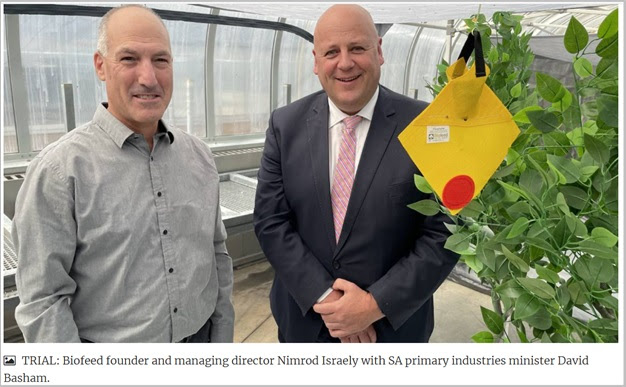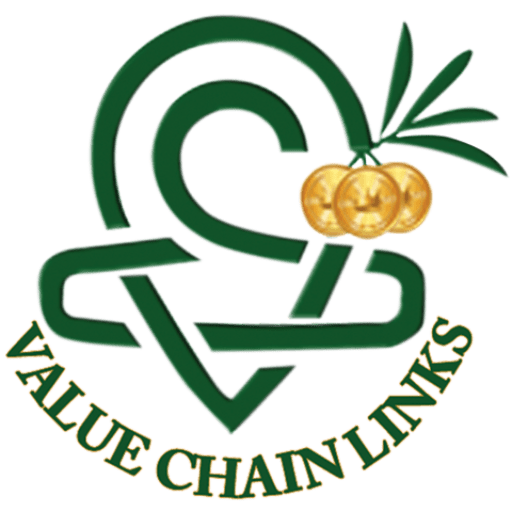CAN WE AVOID RISK BY NOT CHANGING?

BY DR. NIMROD
“Change will prevail, hunt and conquer even those who fear it.”
EASY DECISIONS HARD LIFE
I grew up on a farm surrounded by many other farms and farmers. They were successful, and so were we.
Yet, my father told me, “We can either grow bigger and survive, or “grow” smaller and finally disappear.” Forty years later, our farm is more extensive while the other farms have disappeared.
In simple words, farmers, like any business owner, need to understand that standing in one place is as good as going backward.
To move forward, you need to run “twice as fast”. This rule applies to everyone, including smallholder farmers and any business looking to survive and succeed along the time!
Hence, when you reach the leaders, present “The Package” concept and ask them to support it. Then

Life is a journey of change. Whether we want it or not, everything we see around us is constantly changing. As “Managers,” we try to gain a certain degree of control over changes by balancing between perceived Risks and Opportunities.
Like a river that whether you are in or out of the water, it will flow, so is Change; it will take place even if you decide “not to decide,” “not to change,” or “to do nothing”.
The farmers around our farm decided “not to change”. It didn’t help them one bit because the world changed, they were left behind, and finally, their farms ceased to exist. As managers, they erred in understanding the changing business environment and its impact on their agro-business.
Below are two examples whereby trying to avoid risk or save, we expose ourselves to more significant risks and costs due to the nature of “change”.
DECISION 1: AVOID RISKS
We tend to think that emerging economies have little resources and hence should take no risk. We then mistakenly translate “no risk” into “no change policy”.
It is regrettable that emerging economies, which have the most to gain from applying changes, time after time, decide not to change, hence, keeping the farmers and the country’s economy in a weak and vulnerable state.
It is a thumb role that when you get to an awful situation, where you have nothing to lose, you can benefit more by making courageous “risky” decisions, which eventually may lead to a revolutionary advantage or even a “leapfrog change”.
Remember that a crisis is an opportunity to make required or necessary changes that you wouldn’t dare to do otherwise. The “sense of urgency” enables us to carry on changes that otherwise wouldn’t be possible. Identify those unique moments and seize them.
The Covid-19 crises proved to be a great opportunity to those who ceased, e.g., Zoom Video Communications Inc. (Zoom) was traded on the NASDAQ (before COVID) at a value of $ 60 per share, and thanks to an intelligent takeover of the COVID 19 crisis opportunity, its trading reached $ 560 per share. They took a risk by offering a service at no charge and became the #1 in their category.
Don’t miss big crises to make leapfrog changes. What crisis are you going to exploit and master to lead a “leapfrog change”?
Below are three examples of “changes”. In each, the recipient welcomes “change” but relates to it differently.
(1)

(2)

Devastation may come – a trigger for a change (South Australia, Good Fruit & Vegetables)
(3)

Prosperity is here: press conference in Senegal, announcing the Green Valley program leapfrog results (in French, Thies24.com, and SEN).
It is good to remember that the advanced economies have reached their status thanks to many constant changes. Therefore, not to change, or changing slowly, means; slowdown, decline, and often eventually, disappearance. This is the organization’s life cycle fact.
DECISION 2: DON’T COPY EVERYTHING
One of the most devastating and repeated mistakes that I see is when people want to bring “as is” advanced technologies and practices to their homeland.
They wish to copy-paste without taking the required step of adaptation and customization to their specific goals, challenges, needs, usage, environment, etc.
The line of thinking behind such “copy” behavior is, “If it works well for them, why wouldn’t it work for us?”
That line of thinking has the potential to succeed ONLY if the ENTIRE business environment and eco-system are precisely the same. And that is NEVER so. Countries and even regions within countries will NEVER EVER be the same.
What does it mean?
It means there is ALWAYS a need for intermediation to adapt technology, practice, method, protocol, etc.
It is ALWAYS the responsibility of the “provider” to make the required adjustments, and usually, it would require a dedicated budget, which both sides would like to save. Don’t be tempted to “save”, for the poor outcome would cost you much more.
Here are three examples of attitude towards adaptation to needed technology change.
TOGO
When the students in Togo asked to come and work with me in Israel, I responded that Israel should go to them.
Why?
Because there is so much adjustment to do while transferring technologies from Israel to Togo, it is far more practical, efficient, and better that the Israeli experts would come to Togo and transfer the technologies as part of A PROCESS.
The experts would then need a “discovery process” to the “new environment” and accordingly conduct tuning and adaptations of their tools, methods, approaches, and technologies. Vice versa, it wouldn’t work, as it didn’t until today!
Don’t think that “adjustments” and “adaptation” are proper only when transferring technology and know-how from an advanced to a less developed economy.
AUSTRALIA
Recently I visited Australia (see above report). The question is, “Why should I go there if South Australia (SA) is an advanced economy, with a very similar climate to Israel, the same host trees, and even the same target pest (the Mediterranean fruit fly)!?”
Because it is never precisely the same!
In our agreement with the South Australia (SA) government (like we do in all our deals agreements conditions), Biofeed ensured the pilot itself would start only after I arrived at the site (in this case, in SA).
Why? Because this is our way of making sure that the technology, tools, and methods are used correctly. And more importantly, that they would get the RESULTS they desire and I expect.
Was it worth the 34-hour flight, each way, the two weeks COVID-19 quarantine, and the thousands of $ expenses?
The investment by both sides was decently considerable. But now, I can say that by following our service procedure and practice, which includes “in field visit,” we increased by tenfold the chance for achieving the desired results. This is very critical when the goal is – ERADICATION.
SENEGAL
We applied the same practice in Senegal for each geographic region and sometimes even for nearby villages that differ by culture, tree training, skills, experience, etc.
Was it worth it?
For the first time, farmers, those participating in the Green Valley program, could harvest mangoes free of fruit flies, including during the rainy season, without touching a sprayer or any chemical.
But the most important thing is that farmers increased their income by 50% to 500% in a single season!
Knowing the above outcome; “Do you still think we should have “saved” and skip on the infield adaptation process, or was it part of the core reasons for the success?”
NO CUSTOMIZATION PROCESS, NO DEAL!
Fruit flies have a catastrophic, chronic, and long-term impact on farmers’ ability to earn a living and on the country’s economy. In the examples above, we have been exposed to common global problems caused by fruit flies.
The incurred national losses caused by fruit flies range from tens to hundreds of millions of dollars per year and can reach over $ 1 billion or even a few USD Billions in a decade!
Losses of this magnitude negatively affect farmers who, as a result, lose confidence in the state and leadership, their health is harmed by spraying poisonous chemicals, they lose their source of livelihood, remain in poverty, and their children’s future in jeopardy.
This situation has been going on for decades, and nothing was changed UNTIL NOW!
When I was a farmer, I had no choice and needed to spray once or twice a week (with unsatisfactory results) poisonous sprays attempting to control the fruit flies in my orchards.
The agro-chemical companies, who sold me the chemicals, were only interested in selling me more and more chemicals.
It is a fact that they sold the chemicals WITHOUT providing any sort of promise for the expected results.
The companies asked me to pay and pay, but what did I get in return? Not much. I was left to struggle all alone with the chemicals and the same problematic and ineffective protocol as all farmers did. Nothing was tailor-made for my orchards; the problem was not solved and remained as it was.
The agro-chemical companies never asked me if, following the sprays, my income or profit improved or how the sprays affected my health, the environment, or the biological balance in my orchards.
They may not have done so because they did not want to hear the answers, and more importantly, they did not want me to think about these questions and their answers.
Today, after many years of work, Biofeed developed, field-tested, and supplies the technology and specific knowledge to create a new and better future.
We do this, by stopping the business bleeding and health/environmental problems caused by fruit flies and current ineffective solutions.
Biofeed team and I are interested in farmers’ income, health, and environmental impact, so we ask many questions. We don’t sell a product; instead, we ask questions and provide a tailor-made, customized solution to the problem you have with fruit flies.
This is how we make sure you will get the field and business RESULTS you desire, and we expect.
What can make this possible future not to realize?
There is no magic here, and improper or not suitable use of the FreeDome technology may not lead to the desired and expected field and business results.
How do we solve it?
We start by NEVER sending units (technology) alone, but ALWAYS as part of a program.
The program takes the parties through a process that includes understanding your operational problems, challenges, natural and business environment, targets, and goals.
| BY A FARMER FOR FARMERSBiofeed was founded by a farmer (me) whose interest is not in selling chemicals but in ensuring that ALL other farmers will enjoy better livelihood while keeping their health and the environment safe.Biofeed is about enabling farmers to simultaneously achieving crops protection and business goals. For the Biofeed team, it is about the field and business results that you will get.We are so result-oriented that sometimes it means that we need to say to you “NO”. We say “NO” when we understand that the terms and conditions imposed by you do not allow us to help you achieve your goals.The Green Valley program and Package are made to convert our breaking through technology, know-how, protocols, methods, and worldwide experience into your (field and business) success. It is designed in a modular and flexible way to tailor-made it per environment, requirement, country, and crop.The Green Valley program aims to achieve profound long-term economic changes.For this, the Green Valley program brings “A Package” of field-tested and a proven set of tools, methods, technologies, and experience that ensures that the overall solution will work properly.More importantly, the results you get will be as we expected and you desired. Above all, when you work with Biofeed, you are never left alone with your problems because we make “your problems” ours.The Green Valley program is not for you if you think you have no problems or already have a good solution and all you need is a piece of technology to change a fundamental problem. |
| TAKEAWAYS» EVERYBODY NEED CHANGE, but emerging economies need to change NOW and at a much faster pace.» THERE IS ALWAYS a need for “adjustments” and “adaptation” when a technology, practice, protocol, etc., are transferred from one place to another.» A FUNDAMENTAL long-term change is the result of a process.» THE GREEN VALLEY’S concept and package were designed and developed to change fundamental chronic problems that threaten or hurt farmers’ income and future. |
| Please, if you found value in this article, it would mean a lot to me if you sent me a comment and shared it with your friends. |
